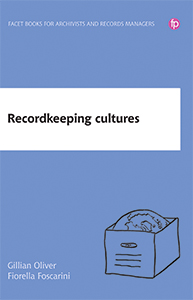
Primary tabs
You don't need to be an ALA Member to purchase from the ALA Store, but you'll be asked to create an online account/profile during the checkout to proceed. This Web Account is for both Members and non-Members.
If you are Tax-Exempt, please verify that your account is currently set up as exempt before placing your order, as our new fulfillment center will need current documentation. Learn how to verify here.
- Description
- Table of Contents
- About the authors
Recordkeeping Cultures explores how an understanding of organizational information culture provides the insight necessary for the development and promotion of sound recordkeeping practices.
The book is a fully revised and expanded new edition of the authors’ 2014 book Records Management and Information Culture: Tackling the People Problem. It details an innovative framework for analyzing and assessing information culture, and indicates how to use this knowledge to change behavior and develop recordkeeping practices that are aligned with the specific characteristics of any workplace.
This framework addresses the widely recognized problem of improving organization-wide compliance with a records management program by tackling the different aspects that make up the organization's information culture. Discussion of topics at each level of the framework includes strategies and guidelines for assessment, followed by suggestions for next steps: appropriate actions and strategies to influence behavioral change.
This new edition has been fully revised and update to greatly enhance the practical application of the information culture concept in both formal and informal recordkeeping environments and contains new chapters on
- diagnostic features: genres, workarounds and infrastructure;
- workplace collaboration: how to analyze collaborative practices in organizations (including recordkeeping); and
- education: how to teach information culture concepts and methods in archives and records management graduate programs.
Introduction to the second edition
PART 1
1 Background and context
The concepts of information culture and recordkeeping culture
Underlying theory
The information culture assessment framework
Why recordkeeping culture?
Summary and conclusions
Notes
References
PART 2
2 The value accorded to records
Cultural influences
Attitudes and behaviours
Recordkeeping infrastructure
IT usage: the EDRMS challenge
Assessment techniques
Interventions
Summary and conclusions
References
3 Information preferences
Words or pictures?
Sharing information
Assessment techniques
Interventions
Summary and conclusions
Notes
References
4 Regional technological infrastructure
Dealing with your organisation’s broader technological context
Assessment techniques
Interventions
Summary and conclusions
Notes
References
PART 3
5 Information-related competencies
The training imperative
Information-related competencies
Assessment techniques
Interventions
Summary and conclusions
References
6 Awareness of environmental requirements relating to records
Researching recordkeeping requirements
Other requirements
How to do it
Organisational or community policy
Assessment techniques
Interventions
Summary and conclusions
Notes
References
PART 4
7 Corporate information governance and recordkeeping and systems and tools
Information governance
Information architecture
Security
Cloud computing
Recordkeeping systems and tools
Assessment techniques
Interventions
Summary and conclusions
Note
References
Gillian Oliver
Dr. Gillian Oliver is Associate Professor of Information Management at Monash University in Australia. Previously she led teaching and research into archives and records at Victoria University of Wellington and the Open Polytechnic of New Zealand. Her research interests focus on data cultures, including the information cultures of workplaces and issues relating to the continuity of digital information, particularly in development contexts. She is the author of four books and is co-editor-in-chief of the journal Archival Science.
Fiorella Foscarini
Fiorella Foscarini is Associate Professor in the Faculty of Information at the University of Toronto. She holds a PhD in archival science from the University of British Columbia. Before joining academia, she worked as an archivist and a records manager for various institutions, including the European Central Bank and the Province of Bologna. She also taught archival studies at the University of Amsterdam. She currently serves as General Editor of Archivaria.


